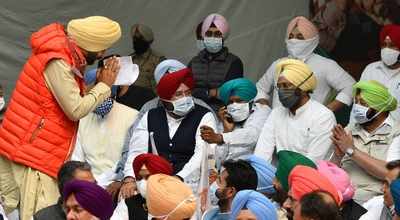- News
- India News
- No factionalism in Punjab, just diversity of views: Congress as Amarinder, Sidhu spar publicly
Trending
This story is from May 18, 2021
No factionalism in Punjab, just diversity of views: Congress as Amarinder, Sidhu spar publicly

"Why do you forget that democracy is all about diversity?" Congress spokesperson Supriya Shrinate told a press conference. "It is wrong to give it the name of factionalism."
She said the priority of Punjab chief minister is to fight and defeat the Covid pandemic, and not anything else including the alleged infighting.

She also said there was no need for the central leadership to intervene in the state unit matters as issues arising out of differences of opinions can be resolved within the party at various levels.
"In Punjab, there is diversity of views as there could be differences of opinion between the leaders, but there is no factionalism," she said when asked about the open sparring between Singh and Sidhu.
Amarinder Singh and Sidhu have publicly sparred over the probe into the sacrilege issue, after the high court quashed the probe report by the SIT headed by Kunwar Vijay Pratap Singh. Sidhu raised questions over the delay in granting justice in the sacrilege case.
"The Congress party believes that the more diversity in views bring better solutions," Shrinate said.
Without naming any leader, she said that at least the CM is not threatening doctors or bodies are not flowing in rivers in Punjab as the focus is on controlling the pandemic and not infighting.
She claimed that unlike in BJP-ruled states where "leaders are afraid to speak out", Congress members in states ruled by it express their thoughts openly and freely.
There has been alleged infighting within the Punjab unit of the Congress with Sidhu taking up issues with the chief minister on one side and former minister Pargat Singh alleging that he was threatened by a close aide of Singh in the chief minister's office.
Rajya Sabha MPs from Punjab Pratap Singh Bajwa and Shamsher Singh Dullo have also been critical of the chief minister and have raised questions on several decisions and issues of governance in the state.
End of Article
FOLLOW US ON SOCIAL MEDIA










